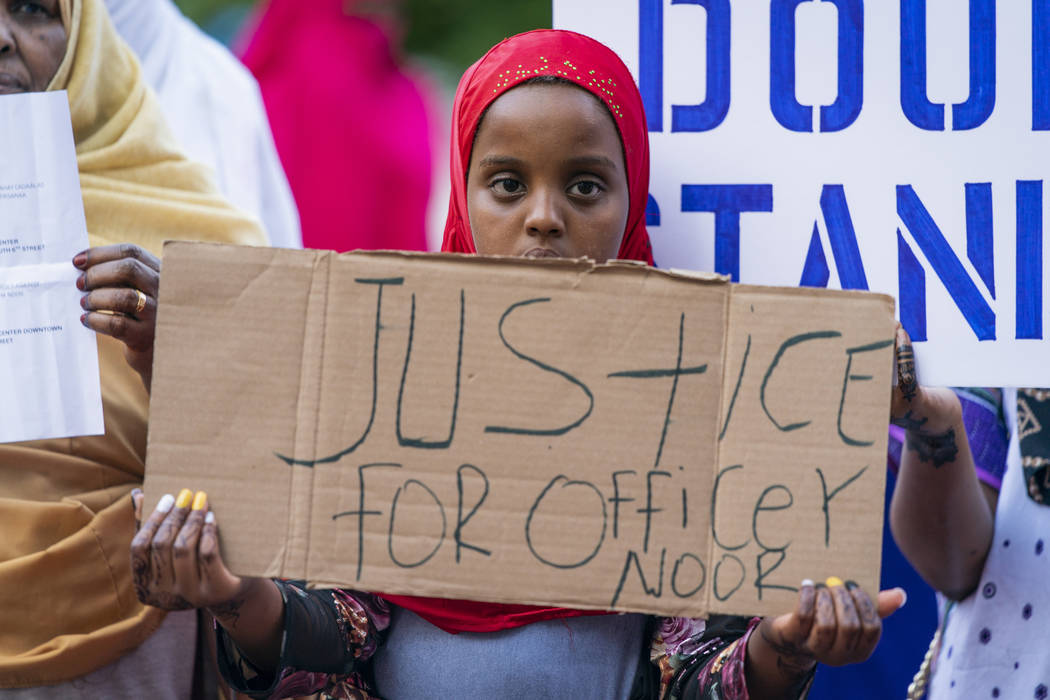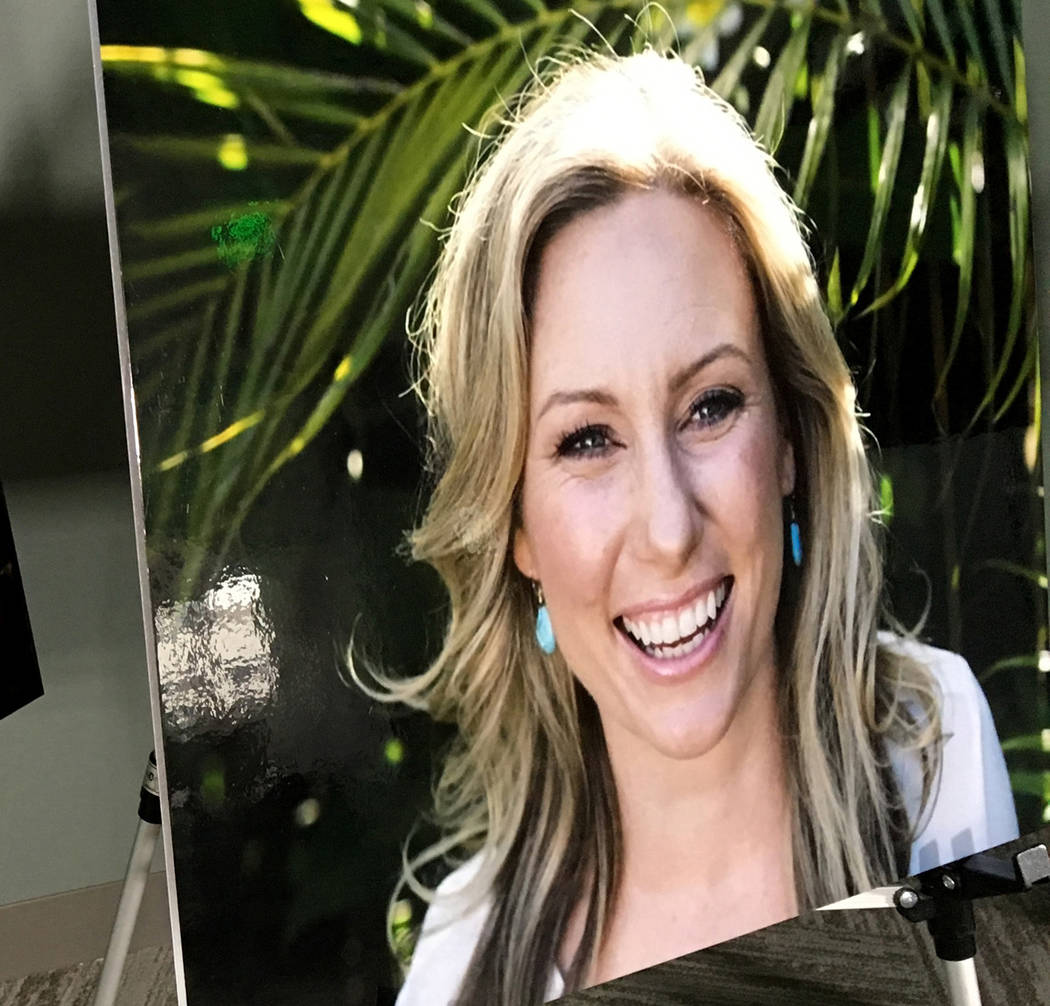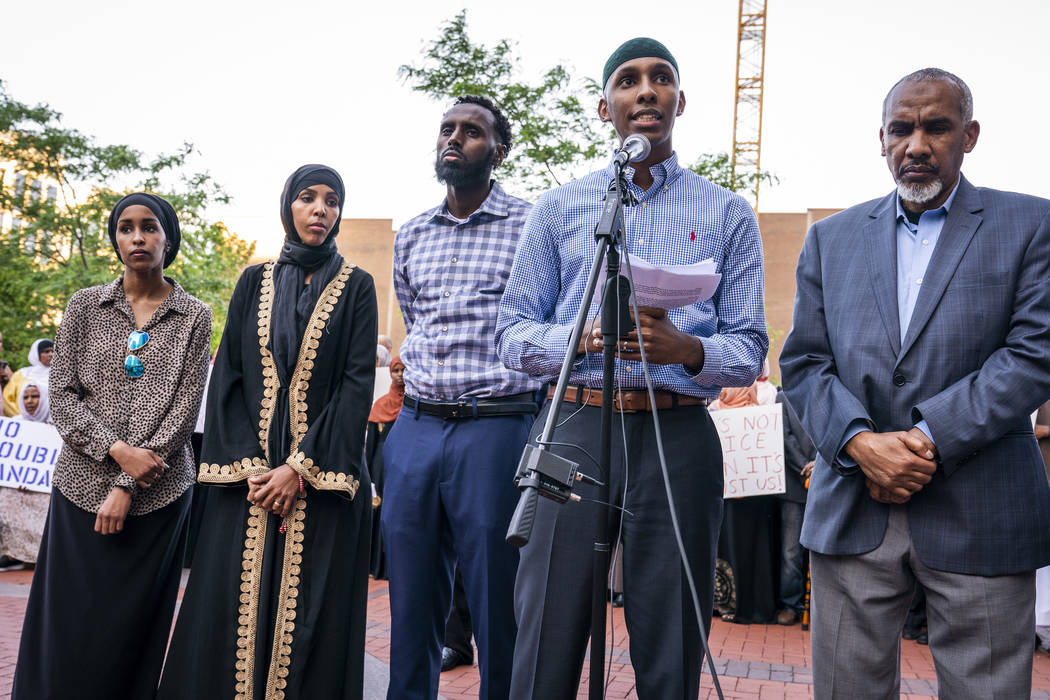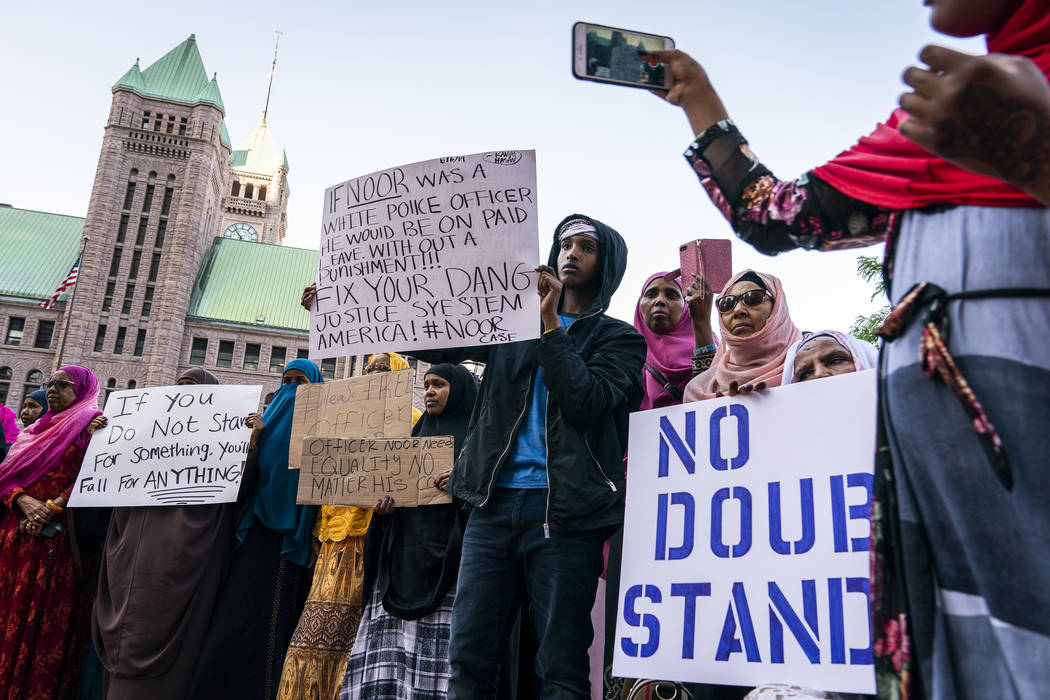Officer who shot 911 caller sentenced to 12½ years in prison
MINNEAPOLIS — A former Minneapolis police officer who shot and killed an unarmed woman who had called 911 apologized to the woman’s family Friday for “taking the life of a perfect person,” just moments before a judge brushed off a defense request for a light sentence and ordered him to prison for 12½ years.
Mohamed Noor was convicted in April of third-degree murder and second-degree manslaughter in the July 2017 death of Justine Ruszczyk Damond, a 40-year-old dual citizen of the U.S. and Australia. Noor shot Damond when she approached his squad car in the alley behind her home.
Noor’s lawyers had argued for a light sentence, saying sending him to prison would only compound the tragedy, and that incarceration wouldn’t let him do service to make amends for killing Damond.
But Judge Kathryn Quaintance sentenced Noor, 33, to a term identical to the recommendation under state guidelines.
“The act may have been based on a miscalculation, but it was an intentional act,” Quaintance said. “Good people sometimes do bad things.”
Noor, his voice breaking several times as he spoke publicly about the shooting for the first time, apologized repeatedly to Damond and her family.
“I have lived with this and I will continue to live with this,” Noor said. “I caused this tragedy and it is my burden. I wish though that I could relieve that burden others feel from the loss that I caused. I cannot, and that is a troubling reality for me.”
Pulled trigger , felt fear
Noor said from the moment he pulled the trigger he felt fear, and he was horrified to see Damond’s body on the ground.
“Seeing her there, I knew in an instant I was wrong,” Noor said. “The depth of my error has only increased from that moment on. Working to save her life and watching her slip away is a feeling I can’t explain. … It leaves me sad, it leaves me numb, and feeling incredibly lonely. But none of that, none of those words capture what it truly feels like.”
Noor’s attorneys argued in a court filing ahead of Friday’s sentencing that nobody would benefit from a long sentence, and that being in prison would keep Noor from making amends for killing Damond by doing good works in the community. They submitted letters of support that they said showed that Noor is a kind and peaceful man who has tried to be a bridge between Somali Americans in Minnesota and the larger community.
Tom Plunkett, Noor’s attorney, made the case for a lenient sentence saying the victim can’t be forgotten but what’s best for the community and Noor must also be considered.
“I have never stood up at sentencing with anyone my entire career that’s done more or worked harder to be a good person, to earn the gifts he’s been given,” Plunkett said. “That’s who Mohamed Noor is.”
Judge follows guidelines
But prosecutor Amy Sweasy called for the 12.5-year sentence recommended under state guidelines.
“The law is not concerned necessarily with what’s good for the community,” Sweasy said. “The court must give a sentence proportional in severity to the crime committed.”
A jury convicted Noor in April of third-degree murder and second-degree manslaughter in the July 2017 death of Damond, a 40-year-old dual citizen of the U.S. and Australia who was engaged to be married a month after the shooting. Noor shot Damond when she approached his squad car in the alley behind her home. He was fired from the department in March.
Don Damond, Justine’s fiance, said in court Friday that every time he sees the alley where she walked barefoot and in her pajamas toward the police car he relives the moment.
“In my mind I beg you to turn around,” he said, speaking of a “lost future” of decades filled with “love, family, joy and laughter.” He said Justine was his soul mate and he misses her “every day, every moment.”
“We both lived with our hearts open, caring for others,” an emotional Don Damond said.
Noor testified during his trial that a loud bang on the squad car scared him and his partner, and that he saw a woman at his partner’s window raising her arm. He said he fired to protect his partner’s life. But prosecutors criticized Noor for shooting without seeing a weapon or Damond’s hands, and disputed whether either of them really heard a bang.
Father sought maximum term
Justine’s father John Ruszczyk, in a statement read in court, asked for the maximum sentence and called her killing “an obscene act by an agent of the state.”
“Justine’s death has left me incomplete — it is as if I have lost a limb or a leg,” he said in the statement. “I have lost my daughter, I have lost those private conversations over tea.”
Noor sat quietly at the defense table with hands clasped, staring straight ahead and showing no emotion as victim impact statements were read.
Sparked outrage, racial questions
Damond’s death sparked bewilderment and outrage in both the U.S. and her native Australia. The case was also fraught with race. Damond was white, and Noor is Somali American, leading some to question whether the case would have been handled the same if the victim had been black and the officer white. While the city agreed to a $20 million settlement with Damond’s family soon after Noor’s conviction, it has yet to settle with the family of Jamar Clark, a black man shot by police in 2015, though in that case police said Clark was struggling for an officer’s gun.
Plunkett and fellow defense attorney Peter Wold proposed to Judge Kathryn Quaintance that she creatively sentence Noor to turn himself in to a county detention facility for a week every year on the anniversary of Damond’s death and on her birthday while he was on probation. They also proposed an annual period of community service.
Under Minnesota’s sentencing guidelines, Noor’s presumptive sentence for third-degree murder was 12½ years, although the judge had the flexibility to impose a sentence anywhere from about 11 to 15 years without providing justification. Any bigger variation would have required an explanation. The presumptive sentence on the manslaughter count was four years.
Noor had been held since his conviction in the most secure unit at the state’s maximum security prison in Oak Park Heights for his own safety, Corrections Department spokeswoman Sarah Fitzgerald said Thursday. He was kept alone in his cell but had the same privileges as other prisoners in the unit and was let out for recreation time, she said.
———
Associated Press writers Amy Forliti and Doug Glass contributed to this story.





















